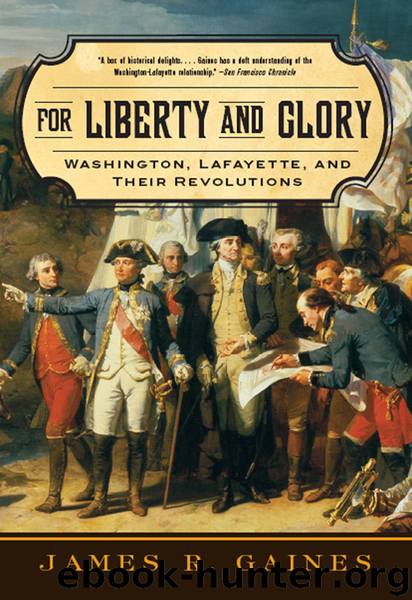For Liberty and Glory by James R. Gaines

Author:James R. Gaines
Language: eng
Format: epub
Publisher: W. W. Norton & Company
Published: 2007-04-09T16:00:00+00:00
All through 1788, in each of the thirteen states, Americans debated the strengths and weaknesses of their new Constitution, whose agenda was in some ways identical to the one emerging from the “Americans” in the Paris Parlement and the Society of Thirty: to merge a collection of assertive localities into a single nation with an executive, a representative legislature, and a government whose power was derived from and bent on preserving the rights of a sovereign people.
Ratification of the U. S. Constitution was not a great deal more certain than the outlook for success in the Estates-General, pitting pro-Constitution Federalists against those who feared the abridgement of states’ rights and the consequences of a powerful executive. They were called “Anti-Federalists” during the ratification process, after which many of them would comprise the core of the party that came to be known as Jeffersonian Republicans.
For the most part, Washington stood aloof from the ratification debate, in part because addressing the issue of executive power in public would have been exceedingly uncomfortable for the man everyone assumed would hold the office. Though he allowed his name to be invoked by those arguing for ratification and wrote many letters in support, all of his statements on the subject were intended to be private and advisory. On one occasion only did he intervene directly in the process. At the point when six of the nine states necessary had already ratified, he heard that Maryland was going to postpone its convention to await the outcome of debate in Virginia, where the Constitution had such oratorical powers against it as Patrick Henry and George Mason. At that, Washington wrote to both Maryland governor Thomas Johnson and Lafayette’s former aide James McHenry, who had represented Maryland at the Constitutional Convention. He pleaded with them not to suspend their convention, arguing that delay would encourage the Constitution’s enemies and raise the chances of a rejection in Virginia that could sway other states as well.
In the event, Washington’s argument was moot: Maryland overwhelmingly approved the Constitution on the day after he wrote those letters, a full month before Virginia even convened. But the debates at the convention in Williamsburg turned out to be just as vigorous as Washington had predicted. Patrick Henry set the tone with his opening question—Why did the Constitution begin with “We, the people” instead of “We, the States”?—and George Mason was even more virulent in opposition than he had been at the convention. Even with Washington’s prestige behind the Constitution and James Madison working the pro-ratification forces on the floor, the vote to ratify was close, 89 to 79. Nevertheless, on June 26, 1788, Virginia became the ninth state Washington knew to have ratified it, which allowed him the satisfying thought that his home state had had the deciding vote.* In a rare outburst of optimism even before the vote had taken place, Washington wrote to Lafayette that he could envision a day “[w]hen the people shall find themselves secure under an energetic government…when the
Download
This site does not store any files on its server. We only index and link to content provided by other sites. Please contact the content providers to delete copyright contents if any and email us, we'll remove relevant links or contents immediately.
| African Americans | Civil War |
| Colonial Period | Immigrants |
| Revolution & Founding | State & Local |
Cat's cradle by Kurt Vonnegut(13857)
Pimp by Iceberg Slim(12924)
Underground: A Human History of the Worlds Beneath Our Feet by Will Hunt(11253)
4 3 2 1: A Novel by Paul Auster(11035)
The Radium Girls by Kate Moore(10903)
American History Stories, Volume III (Yesterday's Classics) by Pratt Mara L(4822)
Perfect Rhythm by Jae(4617)
Wiseguy by Nicholas Pileggi(4583)
The Fire Next Time by James Baldwin(4338)
Paper Towns by Green John(4165)
A Higher Loyalty: Truth, Lies, and Leadership by James Comey(4027)
Pale Blue Dot by Carl Sagan(3997)
The Mayflower and the Pilgrims' New World by Nathaniel Philbrick(3907)
The Doomsday Machine by Daniel Ellsberg(3726)
Too Much and Not the Mood by Durga Chew-Bose(3690)
Killers of the Flower Moon: The Osage Murders and the Birth of the FBI by David Grann(3606)
The Borden Murders by Sarah Miller(3582)
The Sympathizer by Viet Thanh Nguyen(3468)
Killing England by Bill O'Reilly(3451)
